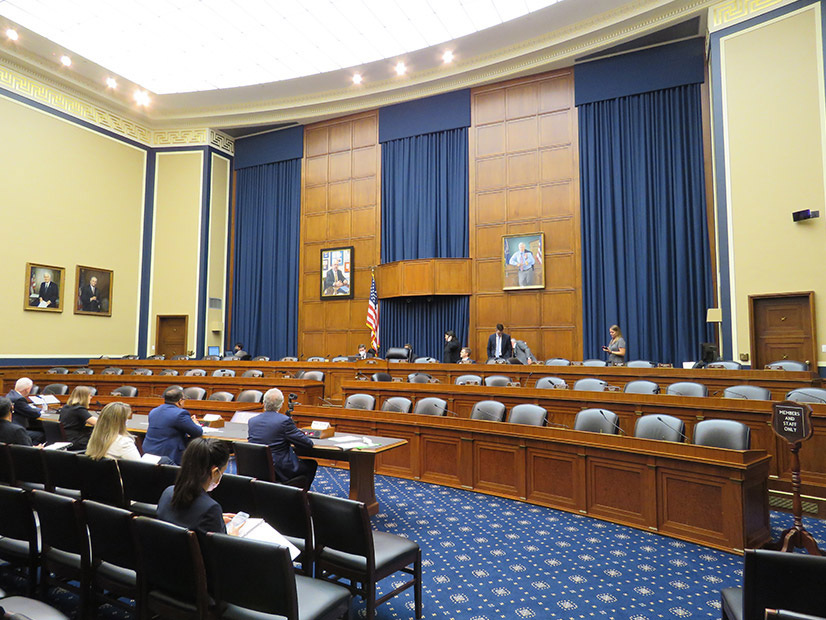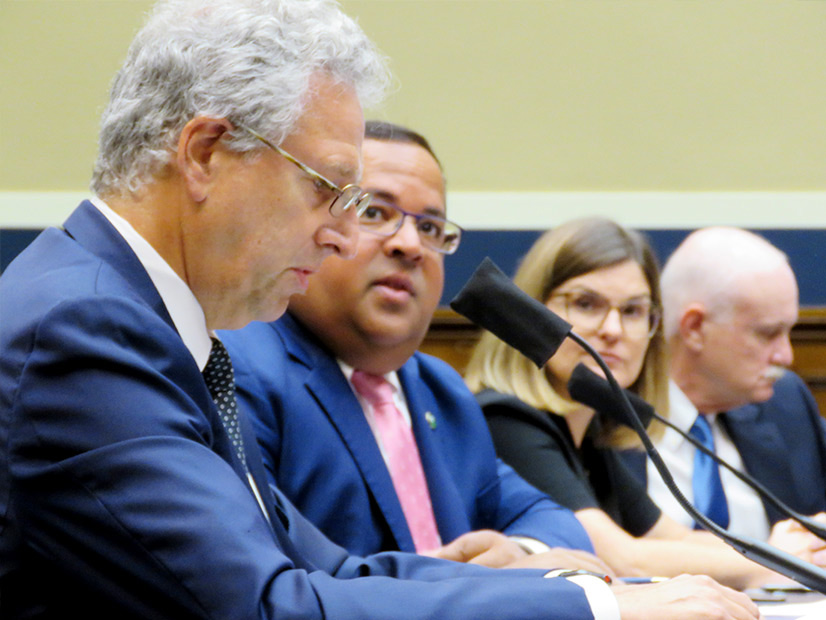
WASHINGTON — FERC Chair Richard Glick bobbed and weaved his way through a House Energy and Commerce subcommittee hearing Tuesday as Republicans attempted to pin him to positions on natural gas and decried the Biden administration’s climate policies.
Glick and his fellow commissioners also addressed numerous questions on the cybersecurity of the nation’s oil and gas pipelines.
The hearing spanned almost five and a half hours, including a 90-minute recess during floor voting, but only the FERC commissioners, their staff and committee staff attended all of it in the John S. Dingell Room at the Rayburn House Office Building. About 17 Democrats and 14 Republicans made statements and asked questions during the hearing. Many of them sought to win endorsements of legislation they had sponsored or bring attention to issues in their districts. But none of those participating in person — Chair Bobby Rush (D-Ill.) and several representatives joined via video — remained for the entire hearing.
Many of the representatives left the hearing shortly after getting their five-minute spot to question the commissioners. Two — Reps. Greg Pence (R-Ind.) and Marc Veasey (D-Calif.) — arrived just before their time slots and left immediately after. When Rush called a recess for a floor vote after more than three hours of testimony, all the members of the subcommittee had left the meeting room, leaving the FERC commissioners with only staffers.

Preserving the US ‘Standard of Living’
Rep. Cathy McMorris Rodgers (R-Wash.) was among the Republicans who insisted climate change concerns should not impinge on Americans’ lifestyles. The government must “make sure policies work for people: protect our way of life; protect our standard of living. We must make sure that our policies enable, not undermine, access to affordable and reliable energy,” she said. “We all agree in the importance of a clean energy solution, but not as a substitute for the affordable energy that keeps the lights on.”
Rodgers said state renewable energy mandates and “certain existing electric market structures are driving out traditional baseload generation,” resulting in what she called “an electric reliability crisis.”
Rep. Bill Johnson (R-Ohio), who proposed a bill (H.R.1575) that he said would “cut Washington red tape” slowing LNG exports, got into a testy exchange with Glick.
Johnson said the Biden administration was undermining efforts to project American power abroad by “greenlighting” Russia’s Nord Stream 2 gas pipeline while expressing “disdain for America’s domestic pipeline infrastructure and support for [a] radical rush to decarbonization.”
Citing data from the National Energy Technology Laboratory that found U.S. LNG has lower lifecycle emissions than Russian gas, Johnson pressed Glick on whether FERC would include climate considerations in reviewing permits for LNG export terminals.
Glick said court rulings limit FERC to considering only direct emissions, and that downstream impacts are under the jurisdiction of the Department of Energy. “I understand your question, Mr. Johnson; we just don’t have authority to consider that,” Glick said.
“Well sure you do,” Johnson shot back. “You just don’t want to answer.”
Rep. David McKinley (R-W.Va.) challenged Glick over FERC’s March ruling on Berkshire Hathaway Energy’s proposal to replace 87 miles of facilities on its Northern Natural Gas pipeline — the first time the commission assessed the greenhouse gas emissions of a proposed natural gas infrastructure project and its impact on climate change. (See FERC Assesses Climate Impact of Gas Project for 1st Time.)
“What level of CO2 emissions is going to be acceptable?” he asked, accusing Glick of making “very subjective determinations.”
Rep. Nanette Diaz Barragán (D-Calif.) returned to the subject at the end of the hearing, asking Glick “what is the threshold at which a [gas] project’s climate impact is too great to move forward?”
“I can’t tell you at this point what level of emissions is too much,” he said. “It’s not just the emissions level. It’s actually whether you can mitigate those emissions. There’s a whole bunch of other potential adverse impacts — whether it be [threats to] species or wetlands, to air emissions, to a whole bunch of other impacts associated with a pipeline that the commission, when we consider a certificate proposal, try to mitigate.
“We very well could … require the pipeline developer to mitigate their greenhouse gas emissions before we made a final decision on a pipeline. [But] we have to address these issues on a case-by-case basis.”
Several representatives used their time to pitch bills they have sponsored, including Scott Peters (D-Calif.), who touted his bill to give FERC “backstop” transmission siting authority if states refused to act. (See Can New Laws Overcome Tx Permitting Roadblocks?)
Rep. G. K. Butterfield (D-N.C.) wants to amend the Natural Gas Act to give FERC the authority to order refunds when an interstate pipeline is found to be overcharging, as the commission has for addressing overcharges by electric utilities under the Federal Power Act. Glick agreed that not having gas refund authority “inhibits us from being able to fully protect consumers.”
Cybersecurity, Pipelines
Cybersecurity and the ransomware attack on the Colonial Pipeline were raised by several representatives, including Ranking Member Fred Upton (R-Mich.).
“This is a new reality that all of us have to deal with in the energy space,” said Commissioner Neil Chatterjee, who coauthored an article with Glick in 2018 that urged Congress to move responsibility for pipeline security from the Transportation Security Administration to an agency with sufficient resources to address cybersecurity threats.
“If a missile had taken out the Colonial Pipeline, we would very clearly recognize that as an act of terrorism or war and known how to respond accordingly. Our mindsets are not quite there yet for something like a cyberattack taking out critical energy infrastructure,” Chatterjee said. “But the reality is the economic and national security impact is the same as if it was a missile attack. So I think it’s incumbent upon all of us to remain vigilant, identify regulatory gaps and work to stay ahead of this.”
“When you look at what happened on the pipeline, the seriousness of that demands a response much higher than an economic regulator such as FERC” can provide, added Commissioner Mark Christie.
In May, Glick and Commissioner Allison Clements called for “mandatory cybersecurity standards,” like NERC’s Critical Infrastructure Protection (CIP) standards, to cover the nation’s 3 million miles of natural gas, oil and hazardous liquid pipelines.
There is “a mismatch between the mandatory standards that the electric industry follows and the voluntary guidance that the pipeline industry currently follows” under TSA, Glick told the committee Tuesday.
Earlier this month, TSA announced that it would require operators and owners of “critical” pipelines to develop and implement a cybersecurity contingency and recovery plan, including protections against ransomware and other threats. (See TSA Issues New Pipeline Cybersecurity Requirements.) Glick said he had not reviewed the proposal.
Glick said he would like to see additional supply chain protections for entities regulated by NERC.
“As we saw in the SolarWinds example, the supply chain is not safe currently from cybersecurity threats,” he said. “We have a rule that says utilities have to have a plan to address supply chain. I think we need to go forward with that and implement some specific standards.”
Chatterjee said standards are not the only response. He recalled a recent conversation with the CEO of a pipeline company who had been briefed by the Office of the Director of National Intelligence “at a high level that his system was vulnerable, but no one in his company had a high enough security clearance to gain access to the classified briefing to know where to make investments in his system.”
“These kinds of things are easily remediable,” Chatterjee continued. “We need to find ways to [help] the private sector, where these executives now find themselves on the front lines of 21st century warfare. I don’t think that’s a hyperbolic statement; that’s the reality of protecting critical infrastructure today, and we need to work together.”
Different Role
Asked during a break in the hearing for his reaction to his first oversight hearing as chairman, Glick — who like Chatterjee served as a Senate staffer before joining the commission — joked, “It’s a lot easier sitting back behind the members [as staff] than being in front of them.”



